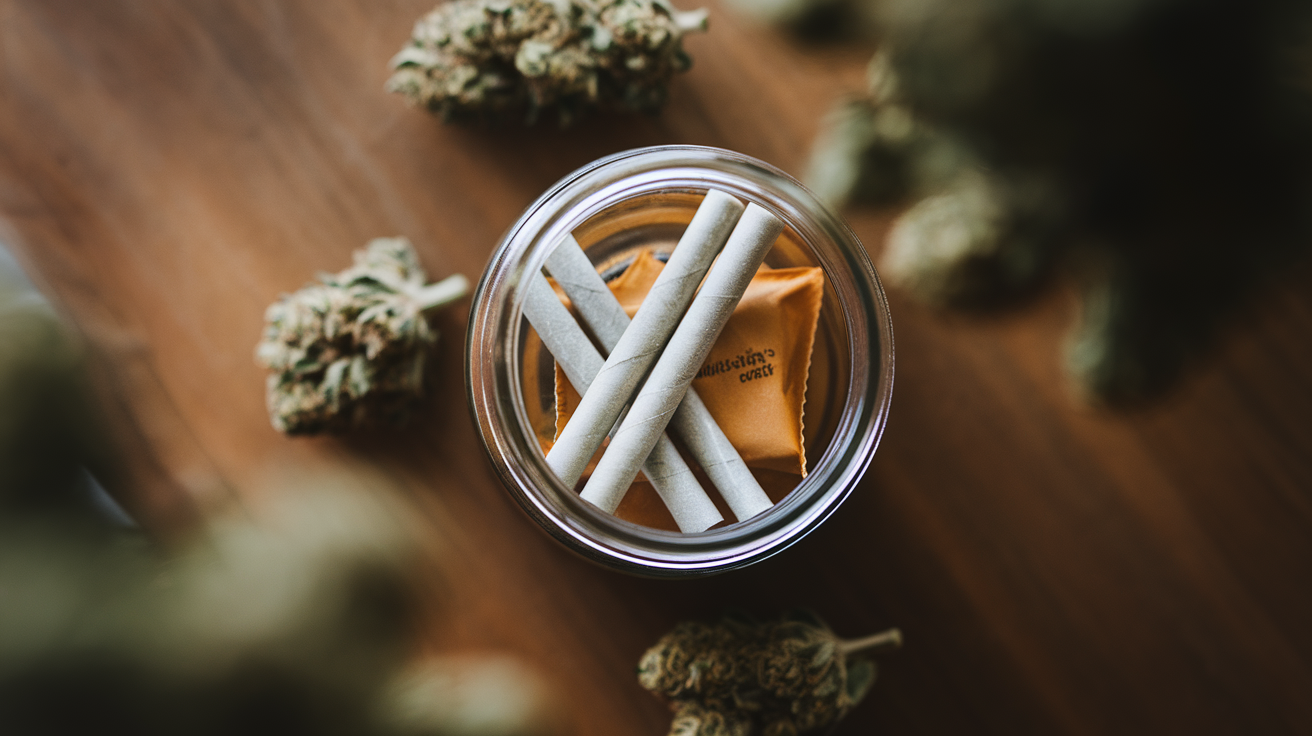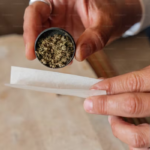
Essential Insights: Organic Pre-Rolled Joints on the Rise
- Purity and Health: Organic pre-rolls prioritize cultivation free from synthetic chemicals, offering a cleaner and potentially safer experience.
- Enhanced Experience: Many users report superior flavor, aroma, and a smoother burn with organic options due to natural terpene profiles.
- Environmental Stewardship: Choosing organic supports sustainable farming practices, reducing ecological footprint and promoting biodiversity.
An organic pre-rolled joint represents a product where the cannabis flower has been cultivated using stringent natural methods. This means the absence of synthetic pesticides, fertilizers, genetically modified organisms (GMOs), sewage sludge, irradiation, or artificial additives. The commitment to organic principles often extends to the rolling papers themselves, which are typically made from natural materials like organic hemp, free from dyes, chemical treatments, or bleaching agents. This holistic approach ensures the purity of the final product, appealing to consumers seeking a healthier and more natural cannabis experience.
The distinction from non-organic pre-rolls is significant. While non-organic cannabis cultivation may employ synthetic chemicals to accelerate growth and increase yield, these methods can leave behind residues in the final product. Just as non-organic produce can absorb chemicals, so too can cannabis plants, raising concerns about potential contaminants that could be inhaled.
Decoding the Differences: Organic vs. Non-Organic Pre-Rolls
The choice between an organic and a non-organic pre-rolled joint is multifaceted, encompassing health, environmental, and experiential considerations. Understanding these key differences is crucial for making an informed decision.
Cultivation Methods and Ingredient Integrity
The Natural Path of Organic Cultivation
Organic pre-rolled joints are sourced from cannabis grown with a deep respect for natural processes. This involves nurturing the plant without reliance on synthetic chemicals, pesticides, or artificial fertilizers. The focus is on fostering soil health, utilizing beneficial insects for pest control, and promoting overall ecosystem balance. This dedication to natural growth minimizes the risk of harmful residues in the final product and contributes to a more authentic terpene profile, which can translate into a richer flavor and aroma.
Conventional Practices in Non-Organic Cultivation
Conversely, non-organic cannabis cultivation often incorporates conventional farming methods that may involve synthetic pesticides, herbicides, and fertilizers. These chemical treatments are designed to maximize yield and combat pests more efficiently. While effective for production, these methods can lead to chemical residues in the plant, which may then be present in the pre-rolled joint. The rolling papers used in non-organic pre-rolls might also be chemically treated or bleached, further raising questions about the purity of the final product.
Health and Safety Implications
Minimizing Exposure with Organic Options
One of the most compelling reasons to choose organic pre-rolled joints is the reduced exposure to potentially harmful chemicals. By avoiding synthetic pesticides and fertilizers, organic cannabis minimizes the risk of inhaling chemical residues. While regulatory bodies strive to test for and limit harmful residues, the inherent nature of organic cultivation aims to prevent their presence from the outset. This commitment to purity can provide peace of mind for consumers concerned about long-term health effects associated with chemical exposure.
Potential Concerns with Non-Organic Products
Non-organic pre-rolls, due to the cultivation methods employed, may contain trace amounts of synthetic chemicals. While the direct long-term health impacts of inhaling these residues from cannabis are still an area of emerging research, general medical knowledge suggests minimizing exposure to foreign chemicals in inhaled products. The presence of additives, flavorings, or chemical enhancers in some non-organic joints can further differentiate them from the cleaner, more natural profile of organic alternatives.
Environmental Footprint and Sustainability
Organic: A Greener Choice
Organic farming practices are intrinsically linked to environmental sustainability. They promote soil regeneration, reduce water pollution from synthetic runoff, and support local biodiversity. By choosing organic pre-rolled joints, consumers contribute to agricultural methods that have a lower environmental footprint and foster healthier ecosystems. This aligns with a growing global consciousness around ethical and sustainable consumption.
Non-Organic: A Heavier Environmental Burden
Conventional cannabis farming, like other conventional agricultural practices, can have a more significant environmental impact. The use of synthetic inputs can lead to chemical runoff that contaminates soil and water sources, potentially harming wildlife and natural habitats. While specific data on cannabis farming’s environmental impact is still developing, the principles of organic agriculture inherently offer a more environmentally responsible approach.
The Consumer Experience: Flavor, Burn, and Transparency
Beyond health and environmental aspects, the tangible experience of using an organic pre-rolled joint often stands out. Enthusiasts frequently report a cleaner, smoother smoking experience, free from chemical aftertastes that can sometimes be present in conventional products. The natural terpenes and cannabinoids from organically grown cannabis are preserved, leading to a more vibrant and nuanced flavor profile.
Many reputable organic pre-roll brands prioritize transparency, providing detailed third-party lab testing results. These reports confirm cannabinoid and terpene profiles, and, crucially, the absence of pesticides, heavy metals, and other contaminants. This level of quality control and transparency is a hallmark of the organic sector, building trust and ensuring consumers receive a product that matches its claims.
The Growing Appeal: Why Organic Pre-Rolls are an Untapped Niche
The escalating demand for organic pre-rolled joints is driven by several interconnected factors:
- Heightened Health Consciousness: Consumers are increasingly seeking “cleaner” smoking options, prioritizing products free from synthetic chemicals.
- Environmental Responsibility: Growing awareness of climate change and environmental degradation pushes consumers towards sustainable agricultural practices.
- Demand for Transparency: Consumers desire to know exactly what they are consuming and how it is produced, leading to a preference for brands that offer rigorous testing and certifications.
- Regulatory Evolution: Advancements in cannabis regulations are encouraging better testing and labeling, further highlighting the benefits of certified organic products.
This confluence of factors positions organic pre-rolled joints as a significant, yet still largely untapped, niche within the broader cannabis market. Brands that can authentically deliver on organic certifications and sustainable practices have a unique opportunity to differentiate themselves and capture this growing segment of conscious consumers.
A Snapshot: Organic vs. Non-Organic Pre-Rolled Joints
To summarize the key distinctions, the following table provides a comprehensive overview of how organic and non-organic pre-rolled joints compare across critical attributes:
| Feature | Organic Pre-Rolled Joints | Non-Organic Pre-Rolled Joints |
| Cultivation Methods | Natural, no synthetic pesticides, fertilizers, or GMOs. Focus on soil health. | May use synthetic chemicals, pesticides, herbicides, and artificial fertilizers. |
| Chemical Residues | Significantly reduced risk of chemical residues. | Potential for trace amounts of synthetic chemical residues. |
| Rolling Papers | Often made from organic hemp or unbleached, natural fibers, free of chemical additives. | May be chemically treated, bleached, or contain additives. |
| Flavor & Aroma | Often described as cleaner, more natural, preserving vibrant terpene profiles. | Can sometimes have a chemical aftertaste; natural flavors may be less pronounced. |
| Burn Quality | Tends to offer a smoother, more even burn with less harshness or “canoeing.” | Burn quality can vary; may burn unevenly or produce more ash. |
| Environmental Impact | Lower ecological footprint, promotes sustainability, reduces chemical runoff. | Higher environmental impact due to synthetic chemical use and potential pollution. |
| Transparency & Testing | Reputable brands typically provide detailed third-party lab testing for purity and potency. | Transparency varies; less common to find comprehensive third-party lab results. |
| Cost | Generally higher due to more labor-intensive farming practices and certification costs. | Typically more accessible and less expensive due to conventional production methods. |
| Market Trend | Rising interest, an untapped niche driven by health and sustainability concerns. | Established market, but facing increased scrutiny from conscious consumers. |
Conclusion: Embracing the Organic Advantage
The comparison between organic and non-organic pre-rolled joints clearly highlights the multifaceted advantages of choosing organic. From enhanced purity and a reduced risk of chemical exposure to environmental sustainability and a superior user experience, organic pre-rolls offer a compelling proposition. As consumers become increasingly informed and health-conscious, the demand for natural, ethically produced cannabis is set to continue its upward trajectory, cementing the organic pre-rolled joint as a premium and responsible choice in the evolving cannabis landscape.
Frequently Asked Questions (FAQs)
What defines an “organic” pre-rolled joint?
An organic pre-rolled joint uses cannabis cultivated without synthetic pesticides, fertilizers, or genetically modified organisms (GMOs). It often also uses organic, natural rolling papers, ensuring a product free from artificial additives.
Are organic pre-rolls truly healthier to smoke?
While direct clinical research on the inhalation of pesticide residues from cannabis is limited, organic pre-rolls are generally considered healthier due to the absence of synthetic chemicals, potentially reducing exposure to harmful residues.
Do organic pre-rolled joints offer a better taste experience?
Many users report that organic joints provide a cleaner, more natural flavor, as the absence of synthetic chemicals allows the cannabis’s natural terpene profile to shine through, leading to a more vibrant and enjoyable taste.
Is there a significant price difference between organic and non-organic pre-rolls?
Typically, organic pre-rolls are more expensive due to the higher costs associated with organic farming practices, including lower yields, more labor-intensive pest control, and certification expenses. However, many consumers find the enhanced quality and benefits justify the cost.
How can I verify if a pre-roll is genuinely organic?
Look for products with explicit organic certifications (e.g., USDA-certified organic or Clean Green Certified). Reputable brands will also often provide accessible third-party lab testing results that confirm the absence of pesticides and contaminants, alongside cannabinoid and terpene profiles.





